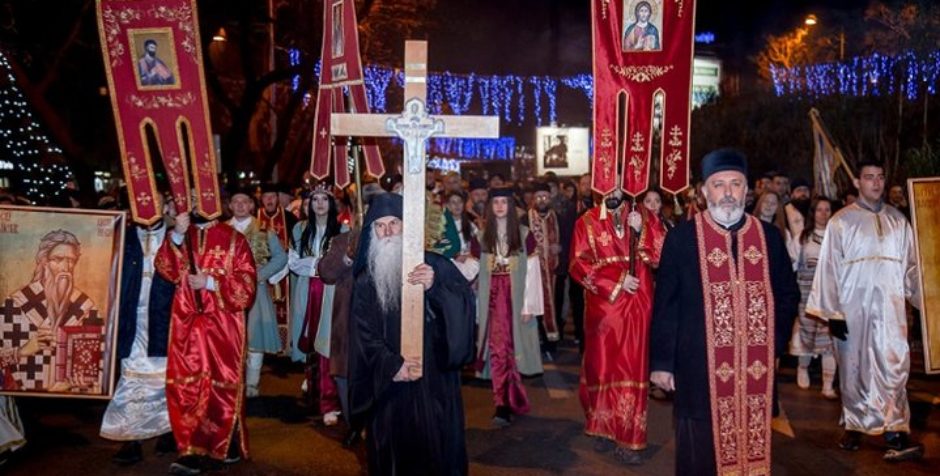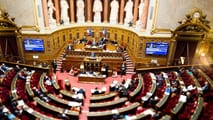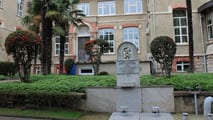

Overview on the Law Against the Serbian Orthodox Church in Montenegro
The Law on churchs in Montenegro
On December 27, 2019, the Parliament of Montenegro adopted a law tabled by the Government on “Freedom of Religion or Beliefs and Legal Status of Religious Communities.” The law was adopted and came into force on January 8, 2020 (Official Gazette of Montenegro, No. 74/2019 of 30 December 2019, available in English here).
Montenegro is chaired by Milo Đukanović, a former communist at the head of the country since 1991. He is accused of massive corruption, but benefits from a diplomatic immunity.
POLITICAL BACKGROUND AND PURPOSE OF THE LAW
In 1920, the Christian Orthodox of Montenegro officially joined the Serbian Orthodox Church, in the context of the foundation of the Kingdom of Yugoslavia. Since that date, almost all the Christian Orthodox in Montenegro have been practicing their faith within the Metropolitanate and three dioceses of Montenegro of the Serbian Orthodox Church.1 The jurisdiction of this church on those dioceses is recognised by all the Orthodoxy (Constantinople and Moscow).
Now, the current authorities want the Christian Orthodox of Montenegro to separate from the Serbian Orthodox Church and are supporting the establishment of a national Church. To this end, through this law, the government is organising the weakening of the Serbian Orthodox Church in Montenegro and the transfer of its proprieties to a “Montenegrin Orthodox Church”. The later church was funded formally in 2001 and is headed by a former priest excommunicated in 1997, who became later a schismatic “bishop”. This Montenegrin church has very few believers and is not recognised by any church, but only by the State.
Therefore, the real purpose of the law is the nationalisation of the Church in Montenegro. The Prime Minister of Montenegro, on May 16, 2019, affirmed that the law “represents the final step on the historical path of cultural emancipation of Montenegro”.
This law may deprive the Serbian Orthodox Church from the name “Orthodox Church”, it confiscates its estates, forbids the founding of religious primary schools, forbids legitimate bishops to exercise their jurisdiction in Montenegro, and violates the rights of the parents to give a religious education to their children.
THE LAW COMPELS THE CHURCH TO APPLY FOR A NEW AND COMPLICATED REGISTRATION
This law requires all religious communities to apply for public registration (art. 18-24), and imposes conditions that are detrimental to the Serbian Orthodox Church (art. 25).
A first problem with this provision is that it requires the Serbian Orthodox Church and its dioceses to apply for their recognition by the State, although they are already recognised under the previous legal regime (of 1977). This is a violation of European law and standards. The 2014 OSCE/ODHIR Guidelines on the Legal Personality of Religious or Belief Communities specifically emphasized that, when enacting new laws regulating the registration process, “States must take into account the rights of already existing communities” and review any legal provision “that have retroactive effect or do not protect acquired rights, such as those requiring re-registration of religious entities according to the new criteria.” The UN Special Rapporteur on Freedom of Religion or Belief stated in his report of December 22, 2011 that such legal provisions were “extremely problematic” and that they often sought to “control a religious community that is believed not to fit into the State’s cultural, religious or political agenda.”
In addition, the law provides that only religious communities having their seat in Montenegro and being a legal person in Montenegro can be registered (Article 25). But the seat of the Serbian Orthodox Church, as well as of two of its dioceses having jurisdiction over part of the Montenegrin territory are not in Montenegro. Therefore, this provision forbids the recognition in Montenegro of the Serbian Orthodox Church and of two of its dioceses.
Article 25
The domain of registration or entry into the Inventory of a religious community in Montenegro shall be within the borders of Montenegro.
The seat of the religious community registered or entered into the Inventory for the territory of Montenegro shall be in Montenegro.
Part of the religious community with the religious center abroad, operating in Montenegro, shall obtain the status of a legal person in Montenegro upon entry into the Registrar or the Inventory.
THE LAW MAY FORBID THE CHURCH TO USE THE NAME “ORTHODOX CHURCH”
According to Article 21 of the law, the name of the religious community applying for recognition “must differ from the names of other religious communities to the extent that allows for avoidance of confusion or mistake in the identification due to resemblance with the name of another registered community. (...) In the event that several religious communities claim to have the right to use the same or similar name (…) the Ministry shall decide”.
This provision allows the State authorities to deprive the Orthodox Church of its name since “the Montenegrin Orthodox Church” is claiming almost the same name.
CONFISCATION AND NATIONALISATION OF ALMOST ALL THE PROPERTIES OF THE CHURCH
Article 62 of the law states:
Religious buildings and land used by the religious communities in the territory of Montenegro which were built or obtained from public revenues of the state or were owned by the state before 1 December 1918, and for which there is no evidence of ownership by the religious communities, shall constitute state property as cultural heritage of Montenegro.
Religious buildings constructed in the territory of Montenegro based on joint investment of the citizens before 1 December 1918, for which there is no evidence of ownership rights, shall constitute state property as cultural heritage of Montenegro.
The existence facts referred to in Paragraphs 1 and 2 of this Article shall be proven by evidence and the rules of evidence set in the Administrative Procedure Act and in absence of such provisions the provisions of the Civil Procedure Code shall apply.
Once registered as a state property, “a State organ” will decide “on the use and disposal of such buildings and land” (Article 64)
This provision has the effect of confiscating most of the properties of the church and religious communities because the Christian Orthodox in Montenegro joined in 1920 the Serbian Orthodox Church. It has to be understood that it was and is still the same and unique Orthodox Church before and after 1920. The law, if applied, would deprive the Christian Orthodox of Montenegro of their historical properties for the benefit of a schismatic State-controlled “church” and of real estate agents.
In addition, the seizure of property creates conditions for massive corruption as it gives hand over these assets to persons who are close to the regime, as evidenced by the high corruption index in Montenegro.
THE LAW PROHIBITS AND HINDERS THE ESTABLISHMENT OF SCHOOLS BY RELIGIOUS COMMUNITIES
According to Article 54 of the Law: “Religious community may establish religious schools at all levels of education, except for primary school, which is compulsory according to the law”. A fine from 2,000 to 20,000 Euros shall be imposed on entities that establish a religious school for primary education (Article 58).
Regarding other religious schools, only a religious community that is recognised may found and run such an establishment. The curricula and contents of the textbooks and manuals of the religious schools are controlled by the public authority responsible for education.
THE LAW HINDERS THE RIGHT OF PARENTS TO EDUCATE THEIR CHILDREN
Article 52 of the law states that “Parents shall have the right to engage in religious teaching of their own child in line with their own religion or beliefs, while respecting the physical and psychological integrity of the child.” The limitation of the right by the reference to the “psychological integrity of the child” is abusive in regard to religious education since it necessarily has a psychological effect.
The law also limits the right of the parents until their children are eleven. Once they are twelve or older, parents do not have the right to give a religious teaching to their children without their consent (Article 51). Otherwise, they may be fined up to 2,000 euros (Article 59).
THIS LAW PROVOKED STRONG POPULAR OPPOSITION
The law was passed with brutal force at 3 a.m., after 17 members of the Parliament opposition were arrested and taken to custody. It was adopted without dialogue with churches or religious communities. One of the MPs is a member of the PACE and was deprived of his passport. Since its adoption, massive and peaceful protests have been taking place every week, gathering up to a third of the population.
THIS LAW IS DENOUNCED BY CHRISTIAN LEADERS
Pope Francis, in a letter sent to the Serbian Orthodox Patriarch dated July 2019, expressed his hope that the proposed law would be adopted on the basis of democratic principles, and will not be adopted without first obtaining the highest consensus possible of all religious communities in Montenegro.
The Ecumenical Patriarch Bartholomew, in a letter of June 2019 addressed to president of Montenegro (read here), pointed out that the Ecumenical Patriarchate, together with all other Orthodox Churches, recognize the High Holy Metropolitan of Montenegro and Littoral Amfilohije, the Archbishop of the Most Holy Serbian Orthodox Church as the only canonical orthodox jurisdiction in Montenegro.
Patriarch and Synod of the Russian Orthodox Church, both before and after the adoption of the law (July and December 30, 2019), stressed that its purpose is to weaken the Canonical Church and to subordinate it to the State - all the more unfair given that Montenegro is supposed to be a secular State.
Tikhon, The Archbishop of All America and Canada, on January 7, 2020, stated that “the Orthodox Church in America supports, and maintains communion with the Metropolis of Montenegro of the Serbian Orthodox Church”, and “stand firmly against all and any government actions provoking confrontation and violence against religious believers and seizure of their religious property.”
The Holy Mount of Athos Brotherhood of the Hilandar Monastery expressed its support to the Serbian Orthodox Church in a letter made public in December 2019.
The Metropolitan Onufriy of Kiev and All Ukraine, wrote a letter in August 2019, stating: “The news that reaches us speaks of the threat of the forcible removal of holy sites and the destruction of specific places of prayerful worship” and “the recent draft law promulgated by the state authorities of Montenegro with a view to adopting a number of discriminatory measures against the Montenegro-Littoral Metropolis of the Serbian Orthodox Church in the question of Church property.” “Unfortunately, all of this is happening on a wave of support by politicians.”
The President of the Conference of European Churches (CEC), Rev. Christian Krieger, on May 4, 2019, urged the government of Montenegro to not unilaterally pass such a law, but to engage in a constructive dialogue on the issue with churches and religious communities, in order to find the best possible solutions, in accordance with the international human rights standards.
U.N. AND EUROPEAN INSTITUTIONS EXPRESSED THEIR CONCERN BEFORE THE ADOPTION OF THE LAW
The UN Special Rapporteur on Freedom of Religion or Belief, Mr Ahmed Shaheed, on May 4, 2019 expressed his concern and hope, “that the government of Montenegro, taking into account the concerns raised, and suggestions provided by different stakeholders, will consider revising the draft law so it becomes compatible with international human rights standards promoting the right to freedom of religion or belief.”
The Venice Commission issued an opinion on June 24, 2019 based on the draft law. It identified a number of substantive issues, notably with regard to church property. It emphasized that the authorities should carry out inclusive and efficient consultations with the public, including representatives of religious communities, which is an important condition in order to reach an agreement as broad as possible on the issues dealt with by the law.
None of the substantive recommendations of the Commission were respected, and the law was passed, in practical terms, in complete contradiction with the Commission’s opinion and the ECHR case law.
The EU EEAS issued a declaration on December 12, 2019 declaring that this matter should be dealt with in an inclusive way, bringing together all relevant stakeholders, and in line with relevant international and European human rights standards.
___
1. See inter alia: Amaël Cattaruzza et Patrick Michels, « Dualité orthodoxe au Monténégro », Balkanologie [En ligne], Vol. IX, n° 1-2 | décembre 2005, mis en ligne le 13 janvier 2010, URL : http://journals.openedition.org/balkanologie/595












